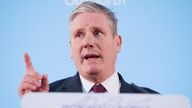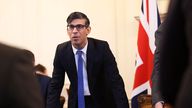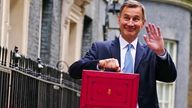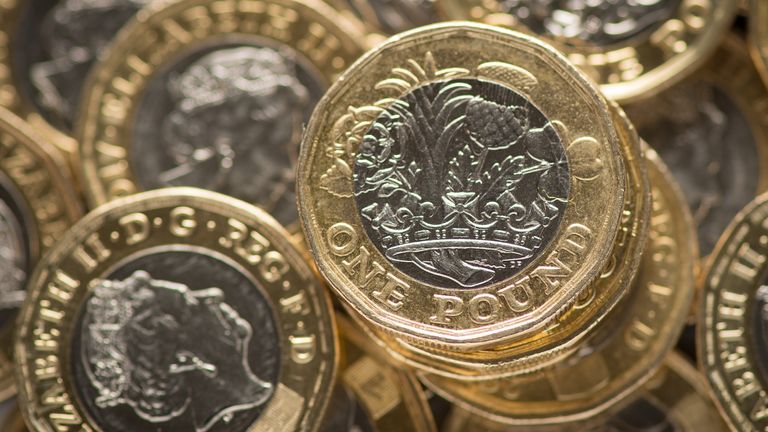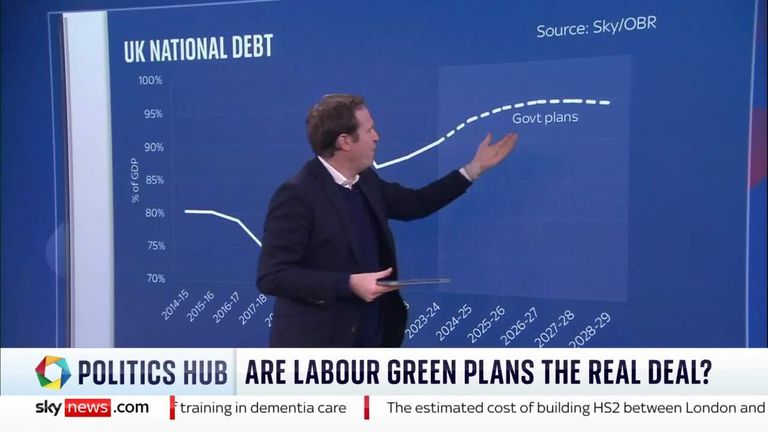Hunt’s hopes for budget tax cuts get a boost
Government borrowing came in sharply lower than expected last month, boosting the chancellor’s aim of pre-election giveaways in his March budget.
Data from the Office for National Statistics (ONS) showed public sector net borrowing at £7.8bn in December.
That was £8.4bn less than in the same month a year earlier and the lowest in any December since 2019.
Economists had forecast a figure above £11bn but debt interest payments fell by more than expected.
Money latest – Martin Lewis writes to chancellor with list of requests
That was due to October’s sharp drop in the retail price index measure of inflation to which many government bonds are linked.
The cost of servicing student loan debt also fell sharply.
The borrowing sum took the total for the first nine months of the financial year to £119.1bn.
While that figure is £11.1bn up on the April-December period a year earlier, it is almost £5bn less than the Office for Budget Responsibility forecast for the period.
Jeremy Hunt told Sky News last week, while attending the World Economic Forum in Davos, that he wants to cut taxes in his 6 March budget as it would be the quickest route to getting the economy growing again.
The UK, like many of its European rivals, is flat-lining as the effects of inflation and the battle to get the pace of price rises down hold back demand.
The chancellor faces a delicate balancing act as he faces demands from Conservative MPs to bolster the party’s popularity in the run-up to the election, expected later this year.
The UK tax burden is running near highs last seen since the wake of the Second World War but he will be anxious to do nothing to diminish the likelihood of interest rate cuts in the months ahead.
A big giveaway would risk stoking inflation, forcing the Bank of England to potentially delay the start of reversing its interest rate hikes which financial markets see from May.
Such a delay could force a halt to falling borrowing costs, particularly for mortgages in the current price war.
The latest inflation data showed an unexpected increase – blamed on a rise in tobacco duties imposed by Mr Hunt in the autumn statement.
The big question is how much wiggle room Mr Hunt will have given the challenges across the global and domestic economy.
At the time of his budget update in November, he was judged to have about £13bn to play with without diverting from his target for bringing down the public debt burden.
Ruth Gregory, an economist with Capital Economics, said that figure was now likely to be around the £20bn area.
“That will probably allow him to unveil a freeze in fuel duty in April 2024 [costing about £6bn a year] but perhaps
also to announce more crowd-pleasing measures, such as a 1p cut to income tax [costing £6.9bn a year], while still maintaining fiscally prudent appearances,” she wrote.
Be the first to get Breaking News
Install the Sky News app for free


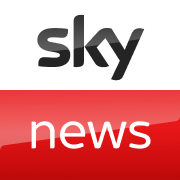
Chief secretary to the Treasury Laura Trott said: “Protecting millions of lives and livelihoods during Putin’s energy shock and a once-in-a-century pandemic has created economic challenges.
“However, it is right that we pay back these debts so future generations are not left to pick up the tab.
“Because of this government’s decisive action, the economy is now beginning to turn a corner. Inflation has more than halved.
“Debt is on track to fall as a share of the economy. And we have been able to afford tax cuts for 27 million working people, and an £11bn tax cut to drive business investment.”
Her Labour shadow, Darren Jones, said: “Rishi Sunak failed to grow the economy and now we know he failed to get debt falling.
“National debt his now at the highest level since the 1960s – and has more than doubled since 2010.
“Britain cannot afford another five years of this low growth, high tax Conservative government that is leaving working people worse off. It’s time for change.”
